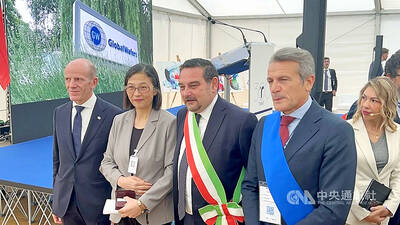Ju Teng International Holdings Ltd (巨騰), the second Taiwanese-owned Chinese company to list on the local stock exchange, rose by its daily limit on its first day of trading yesterday.
The maker of notebook computer casings surged 6.9 percent to NT$18.5 in Taipei. Shares were sold at NT$17.3 each, at the higher end of its NT$14.25 to NT$19 price range.
Ju Teng, whose shares now trade in Hong Kong and which operates plants in China, sold shares on the Taiwan Stock Exchange after the successful listing of Want Want China Holdings Ltd (中國旺旺控股) last month.
“Investors saw Want Want’s strong debut and think the same success can be replicated on Ju Teng,” said Parker Wu (吳年恭), a fund manager at the Agricultural Bank of Taiwan (全國農業金庫), who helps oversee the equivalent of US$44 million.
Last week Ju Teng chairman Cheng Li-yu (鄭立育) said the company’s growth this year, impacted by the global downturn, could fall short of previous years.
But the company has begun to see a demand pickup, with revenues in March and last month growing more than 20 percent compared with those in January and February. Order visibility for some products has extended to the fourth quarter, Cheng said.
After manufacturers raced to launch new netbooks last year, demand for plastic casings grew as companies tried to cut costs, boosting Ju Teng’s plastic casing shipment to 50 million units last year.
Based on notebook computer shipments of between 130 million and 140 million units last year, Ju Teng’s casings had a market share of more than 30 percent.
Local contract notebook computer makers, including Quanta Computer Inc (廣達), Compal Electronics Inc (仁寶), Wistron Corp (緯創) and Asustek Computer Inc (華碩) are all Ju Teng clients. Its top five clients account for 90 percent of the company’s revenues.
As the PC industry moves toward lightweight notebooks this year, manufacturers are increasingly using metal casings to enhance strength and durability.
Ju Teng teamed up with Compal to form metal casing firm Jubao Precision Machining (Jiangsu) Co (巨寶), which shipped around 700,000 units last month. Cheng said Jubao will expand its production capacity after next month to reach 2 million units a month by the end of the year.

RECYCLE: Taiwan would aid manufacturers in refining rare earths from discarded appliances, which would fit the nation’s circular economy goals, minister Kung said Taiwan would work with the US and Japan on a proposed cooperation initiative in response to Beijing’s newly announced rare earth export curbs, Minister of Economic Affairs Kung Ming-hsin (龔明鑫) said yesterday. China last week announced new restrictions requiring companies to obtain export licenses if their products contain more than 0.1 percent of Chinese-origin rare earths by value. US Secretary of the Treasury Scott Bessent on Wednesday responded by saying that Beijing was “unreliable” in its rare earths exports, adding that the US would “neither be commanded, nor controlled” by China, several media outlets reported. Japanese Minister of Finance Katsunobu Kato yesterday also

‘DRAMATIC AND POSITIVE’: AI growth would be better than it previously forecast and would stay robust even if the Chinese market became inaccessible for customers, it said Taiwan Semiconductor Manufacturing Co (TSMC, 台積電) yesterday raised its full-year revenue growth outlook after posting record profit for last quarter, despite growing market concern about an artificial intelligence (AI) bubble. The company said it expects revenue to expand about 35 percent year-on-year, driven mainly by faster-than-expected demand for leading-edge chips for AI applications. The world’s biggest contract chipmaker in July projected that revenue this year would expand about 30 percent in US dollar terms. The company also slightly hiked its capital expenditure for this year to US$40 billion to US$42 billion, compared with US$38 billion to US$42 billion it set previously. “AI demand actually

Jensen Huang (黃仁勳), founder and CEO of US-based artificial intelligence chip designer Nvidia Corp and Taiwan Semiconductor Manufacturing Co (TSMC, 台積電) on Friday celebrated the first Nvidia Blackwell wafer produced on US soil. Huang visited TSMC’s advanced wafer fab in the US state of Arizona and joined the Taiwanese chipmaker’s executives to witness the efforts to “build the infrastructure that powers the world’s AI factories, right here in America,” Nvidia said in a statement. At the event, Huang joined Y.L. Wang (王英郎), vice president of operations at TSMC, in signing their names on the Blackwell wafer to

Taiwan-based GlobalWafers Co., the world’s third largest silicon wafer supplier, on Wednesday opened a 12-inch silicon wafer plant in Novara, northern Italy - the country’s most advanced silicon wafer facility to date. The new plant, coded “Fab300,” was launched by GlobalWafers’ Italian subsidiary MEMC Electronics Materials S.p.A at a ceremony attended by Taiwan’s representative to Italy Vincent Tsai (蔡允中), MEMC President Marco Sciamanna and Novara Mayor Alessandro Canelli. GlobalWafers Chairwoman Doris Hsu (徐秀蘭) said the investment marked a milestone in the company’s expansion in Europe, adding that the Novara plant will be powered entirely by renewable energy - a reflection of its